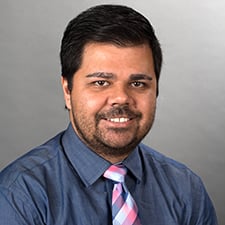Physicians are privileged to see patients at their most vulnerable, to reshape lives and continually revitalize the nation’s health system. In a challenging practice environment, physicians remain driven by the power of healing and the indelible connections they form with patients and families.
The AMA Wire® “When I Knew Medicine Was My Calling” series profiles a wide variety of doctors, offering a glimpse into the lives of the busy women and men navigating new courses in their careers and in American medicine. No matter their age, their specialty or their career stage, they were born to do this and they tell us why.
Share a moment with: Michael S. Sinha, MD, JD, MPH, a postdoctoral fellow for the Program on Regulation, Therapeutics and Law in the Division of Pharmacoepidemiology and Pharmacoeconomics at Brigham and Women’s Hospital, Boston. He is a member of the AMA Young Physicians Section and the AMA Academic Physicians Section.
I was born to: Promote health equity.
The moment I knew medicine was my calling: My father started medical school when I was 1 year old. When I finally realized that becoming a major-league baseball player wasn’t in the cards, I figured medicine was a good second option!
An experience from residency that confirmed my calling as a physician: Finally reaching the patient who had been readmitted 50-plus times for substance abuse and withdrawal. After being clean for a few months, she wrote a thank-you letter to the hospital with the title, “You Saved My Life.” I still have it framed in my office.
An experience from medical school that kept me going: Becoming involved with the hospital ethics committee and the institutional review board helped me understand issues beyond the bedside and reinforced my desire to change health care on a local, state and national level. My first House of Delegates meeting—in Hawaii in 2007—was certainly a nice beginning to my AMA involvement!
My source of inspiration: Every patient inspires me in a unique way. Genuine patient interactions are the key to preventing burnout and depression in medicine. I am also constantly inspired by my colleagues.
My hope for the future of medicine: Equitable health care access for all that does not bankrupt a single patient. A day when vaccinations and other pillars of scientific discovery are not called into question.
The hardest moment in medicine and how I got past it: Seeing a woman my age, just after a fatal polysubstance overdose, being sustained in the ICU for organ harvesting. Getting a thank-you card from the organ bank detailing how many people benefitted from the donations was the consolation I needed.
My favorite experience working with the medical team: The opportunities to teach, especially medical students. I take pride in knowing that several of my M3 clerkship students eventually chose internal medicine.
The most challenging aspects of caring for patients: What the textbooks can’t teach you. Outside of modeling it, I do not believe there is a good way to teach empathy.
The most rewarding aspect of caring for patients: Taking time to listen to their stories and learn about their lives. People are extremely candid with their physicians, and there’s no better way to respect that vulnerability than to listen.
The skills every physician should have but won’t be tested for on the board exam: An understanding of healthcare systems and health economics.
One question students should ask themselves before pursuing medicine: Where do I want to be in 10 years?
A quick insight I would give students who are considering medicine: If you are going to commit at least seven years (or more) to medical school and residency, be sure you know what that choice entails. Burnout and depression are more likely if you view medicine as a path to wealth and status rather than as a calling to serve.
Song to describe my life in medicine: “Readmission,” by ZDoggMD.




